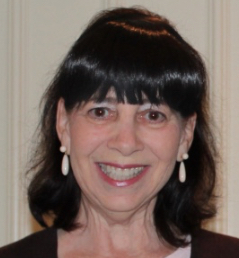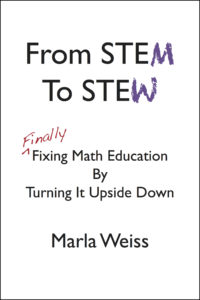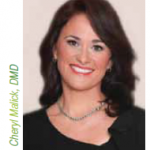Finally fixing math education
by Marla Weiss
 Developing moon rockets and inventing open-heart surgery are “hard”; operating on fractions is not, despite prevailing attitude. After years of helping students experience the beauty of math, I started writing books to address the ongoing problem of inferior math education on a national scale.
Developing moon rockets and inventing open-heart surgery are “hard”; operating on fractions is not, despite prevailing attitude. After years of helping students experience the beauty of math, I started writing books to address the ongoing problem of inferior math education on a national scale.
First, I tried educating people via entertainment by creating my pair of novels “School Scandalle” and “School Scoundrelle” about a passionate math teacher facing hurdles in the education world. Next, I formalized my problem sets that had generated success at the elementary and middle school levels. While these workbooks are a step forward, quality math has maximum reach when in the main curriculum, rather than in supplementary material.
Then, I had my “eureka!” moment, finding the solution to weak math education at the intersection of noted  psychology, modern technology, and rigorous mathematics. While the solution seems obvious now, persuading others is a challenge. Hence, I recently completed my nonfiction book, “From STEM To STEW: Finally Fixing Math Education By Turning It Upside-down.”
psychology, modern technology, and rigorous mathematics. While the solution seems obvious now, persuading others is a challenge. Hence, I recently completed my nonfiction book, “From STEM To STEW: Finally Fixing Math Education By Turning It Upside-down.”
The book includes quotes from hundreds of experts and reports to provide needed background and to bolster important points. By beginning with a simple question reworked in creative ways, the book urges students to explore more than straightforward problems. Plentiful examples of witnessed, deficient math teaching help establish a framework.
Broad definitions of mathematics expand the customary viewpoint. The necessity for mathematical success unfolds as a matter of societal wellness and national security. A summary of the National Assessment of Educational Progress posits that students should be scoring higher. A discussion of the international math exams TIMSS and PISA outlines America’s underperformance in the world. A detailed review of five past reform movements (Sputnik New Math, Back to Basics, Constructivism, Math Wars and Common Core) demonstrates that proposals recycle, while weak math education survives.
Fifty obstacles to finding a solution show ineptitude and disagreement as commonplace. Discussions of learning mathematics, using technology, organizing curriculum and training teachers contribute to a full picture. Ultimately, a plan based on remarkable educational psychology emerges.
Although a washout over a half-century ago due to crude technology, the concept today offers hope for transforming learning, thereby freeing schools from dependence on inadequate textbooks and from the impossibility of finding brilliant math teachers for all children.
What’s next? I’m seeking an established partner to conduct a pilot study, aiming to report significant, positive results. Only then might a new system push aside those who suffer from math phobia and embrace shoddy instruction. Truly understanding math leads to genuine enjoyment and useful application. But society must want and demand great math for radical change to occur.
Marla Weiss, a decades-long resident of Naples, has four degrees in mathematics: A in pure math, MA and ME in applied math, and PhD in math education. Readers may learn more about her work at www.mavabooks.com



Leave a Reply
Want to join the discussion?Feel free to contribute!